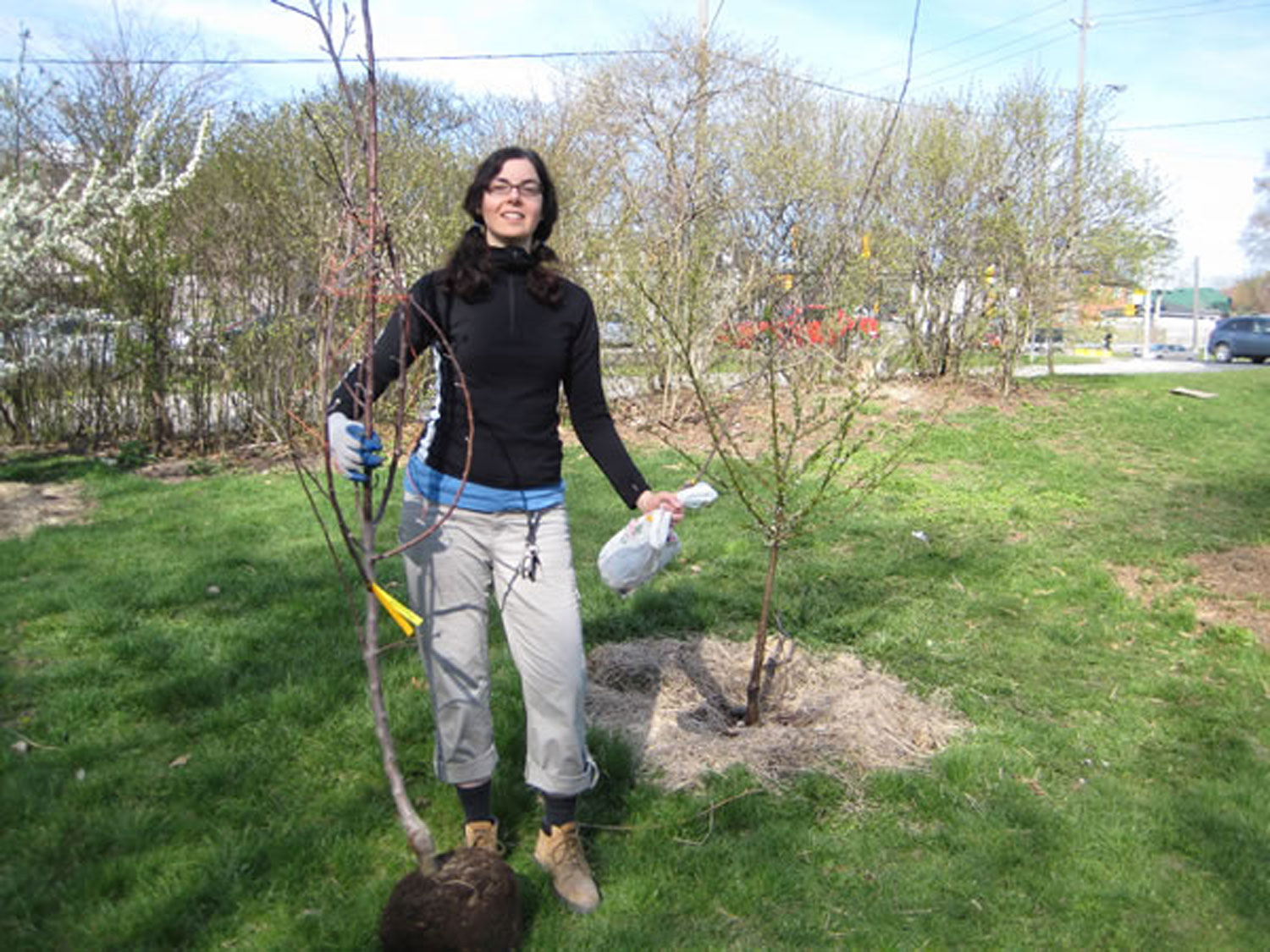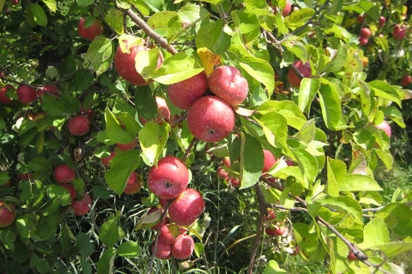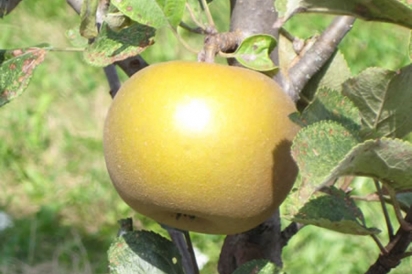Ontario's Exotic Apples
Growing Organically with Disease-Resistant Trees
On a hot day in late August 2012, my husband Cliff and I drove up to one of Ontario's pick-your-own orchards. Our goal was to join an orchard tour and learn the secrets of growing organic fruit. Frankly, we needed some guidance. In 2009, we were amongst a group of volunteers that planted the Ben Nobleman Park Community Orchard in midtown Toronto. Over the years, we'd watched the development of our trees with a mix of pride and despair. Some of the trees had settled in really well; others were struggling. A few had already been cut down after losing a prolonged battle with fungal disease.
So there we were in the welcome centre of Avalon Orchards in Innisfil, waiting for our tour to begin. Visitors pay for their apples here and can also buy cider and apple butter. And baskets of fruit are available for tasting because this orchard doesn't grow well-known apples like McIntosh, Gala or Red Delicious. Instead, they sell more exotic, newer varieties that few of us have ever heard of, including Priscilla, Galarina, William's Pride, Macfree and Nova Spy. This is because Avalon Orchards specializes in little-known apple varieties that thrive in our climate but cannot generally be found in your local shops.
"Initially, new customers come and ask for familiar varieties like Spartan or Gala apples. When they realize I don't grow them, they want me to recommend apples that taste similar. I tell them to go out into the orchard and taste different apples to see what they like. Few people realize that there are thousands of varieties of apples and all have their own unique flavour and character. Some, like Liberty, Freedom and Nova Scotia McIntosh are becoming better known in the places where they were first developed," says Gaye Trombley, the owner of Avalon Orchards.
Gaye showed a small group of us around the orchard. The trees looked beautiful and healthy and were heavy with ripe fruit, even though it was quite early in the harvesting season. Her earliest apples ripen in late August and the harvest continues on though October. Some of the apples are great for baking and drying; others are delicious fresh off the tree. Some of the later apples are "keepers" that, once harvested, can be kept for months in a cool place, giving you the sweet taste of the harvest even in those grim winter months.
As the tour proceeded, it became clear that growing fruit trees organically can be a challenge, even for experienced orchardists. The biggest ordeal is preventing pests and disease. With more than ten thousand trees to take care of, Gaye must keep on top of those problems, and she does so in a variety of ways. She tests her soil regularly and amends it annually. She uses organically approved pest- and disease-control sprays. She creates a healthy ecosystem in her orchard by planting herbs and wildflowers amongst the trees, and she maintains hundreds of birdhouses in the orchard, which attract insect-eating birds such as bluebirds and tree swallows. Most importantly, she plants disease-resistant trees.
"I have seventeen different varieties of fruit trees and they are all disease-resistant varieties, because I'm certified organic and we have to do whatever we can to ensure a high-quality fruit," Gaye says. "A lot of the diseases like apple scab that normally occur in an orchard require a considerable amount of chemical to control. Some conventional orchards spray their trees five times a year to control apple scab alone. So the varieties that I grow are naturally immune to apple scab so we don't have to worry about it."
I like to call these Ontario's "exotic" apples. Why? Probably because it sounds better than "disease-resistant" apples. These are newer varieties that have been developed in the past fifty years or so to have a high resistance and immunity to diseases like apple scab. For some, the idea of "developing" new apple varieties might bring a shiver down their spines and concerns that these trees have been developed in a GMO lab somewhere. This is not the case. (One GMO tree has, in fact, been developed here in Canada, however. The Arctic Apple® has been heralded by its developers as an apple that will not brown after slicing. But this controversial tree has not yet been approved for commercial growing in Canada or the U.S.)
Most disease-resistant fruit trees were developed using age-old techniques such as grafting. The ancient Greeks and Romans, for instance, knew that if they found a wild tree with delicious-tasting fruit, they could cut off some branches and skillfully attach them to the roots of another tree. These two trees would fuse into one and the resulting fruit would be identical in flavour (and genetically identical) to the original tree.
In the same way, if a tree had great-tasting fruit and also remained healthy when others nearby were infected with disease, then it might be chosen as a desirable variety to propagate. Most fruit that you grow or buy today is grown from grafted trees. That keeps tree growers like Ken Roth busy. Each year at Silver Creek Nurseries in Wellesley, Ontario he grafts more than six thousand fruit trees and sells them across Canada. While he has a huge range of varieties, he's noticed that many customers only order the varieties they are familiar with.
"When people are new to growing fruit trees, I recommend they try disease-resistant varieties. There are a lot of good ones that don't get as much attention but [which] people can grow in their yards with a moderate amount of care," he relates.
Eric Hambly is the owner of Siloam Orchards in Uxbridge, Ontario. He sells grafted fruit trees and he also has a pick-your-own orchard. In addition to dozens of other types of heirloom and disease-resistant trees, he and his wife Kathy sell a line of five unique apple trees they helped save from extinction.
"In the '80s, my wife and I took a tour of a New York State experimental station that was closing down. They had developed hundreds of new disease-resistant varieties but they were going to destroy the trees. So we collected massive amounts of propagation materials and brought them back. We grafted them and waited for them to fruit. We discarded the trees that weren't healthy and had fruit tastings to narrow it down to five varieties, which we named Shawnee, Taranado, Jalander, Janeena and Jennavieve."
"You have got to try them to understand the flavours. All are juicy and crisp and ripen in late September and early October. They are all in the sweet-tart range and not too sweet or overly tart. They have lots of character, which is why we kept them," Hambly says.
Ontario's exotic apples are becoming popular with connoisseurs because they are both sustainable and delicious. Farm-to-table chef Jamie Kennedy buys apples from Avalon Orchards. Michael Sacco, founder of the sustainable chocolate company ChocoSol, is developing a new line of "forest garden" chocolate bars and plans to plant his own orchard of disease-resistant trees in the next ten years.
"Using disease-resistant trees is common-sense ecological thinking in a new and improved format," Sacco remarks. "Using this fruit is important today—in our next harvest—and not just in the future."
But which are the best-tasting disease-resistant apples? Everyone has his or her favourite. Gaye Trombley loves Redfree, Liberty and Nova Spy. Ken Roth loves Golden Russet. Eric Hambley's favourite is Jalander.
What will your favourite be? This summer and fall, take the time to find out by visiting some of Ontario's organic orchards. If you're thinking of planting apple trees, consider Ontario's exotic, disease-resistant apple varieties. As I have learned so well through my wonderful—and challenging—experience with the Ben Nobleman Park Community Orchard, fruit trees need plenty of hands-on attention. But planting these sturdy, disease-resistant varieties makes it so much easier to care for your trees in a sustainable way.
Join the members of Slow Food Toronto on September 18 for the official launch of my fruit-tree-care book Growing Urban Orchards, which came out in April, and my online fruit tree care workshops. At the event, we will have an "exotic" apple tasting and you'll be able to mingle with growers and munch on some fantastic apple treats. For more information, visit the Urban Fruit Tree website.







